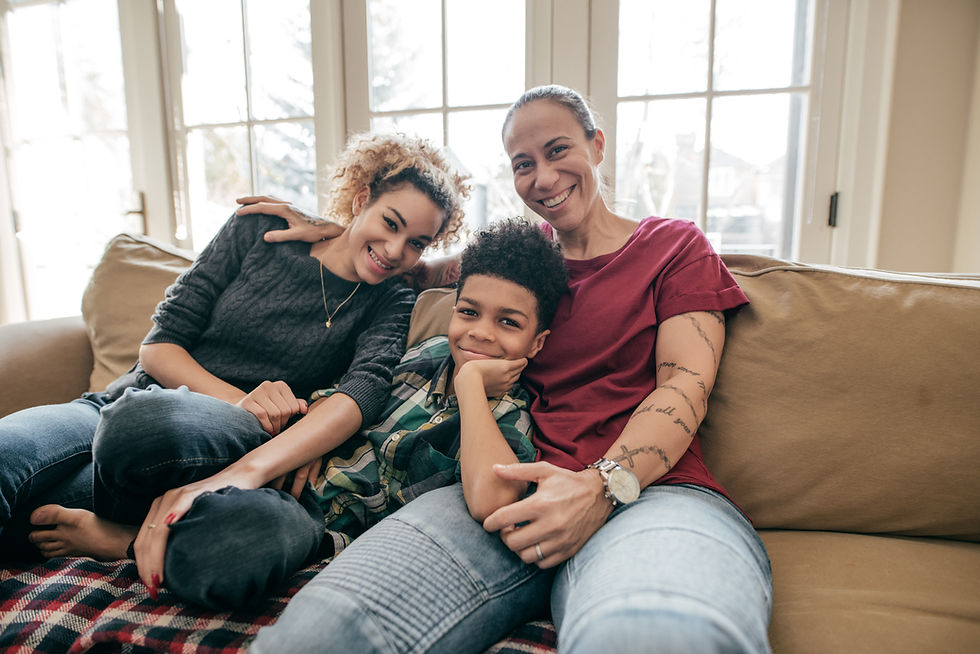Remote Therapy vs. In-Person Therapy for Children and Adolescents
- drmorvwenduncan

- Aug 3, 2023
- 4 min read
Updated: Aug 31, 2023
Online therapy, is it right for your child or teenager?
You may live in an area where there are limited Clinical Psychologists available to support your child or teenagers needs, or they may have waiting lists that are too long, or perhaps you are considering online therapy because it will fit into your daily life and family logistics much easier! Whatever the reason, read on to consider the advantages, disadvantages and what the research says, written by a Clinical Psychologist at The Lotus Psychology Practice.

Following the covid-19 pandemic, we became more reliant than ever on technology. Lessons became remote, birthday parties were online, and even mental health support became an online activity. Although remote mental health care had been around before covid-19, the pandemic forced many clinicians and families to go online, and it became much more widespread than ever before. Known as tele-health or tele-medicine, online therapy enables young people to receive mental health support from the comfort and safety of their homes.
Advantages of Online Therapy:
1. Accessibility:
Remote therapy breaks down geographical barriers, enabling children in remote or underserved areas to access mental health services. It also eliminates the need for physical travel, making it a more convenient option for families with busy schedules, limited transportation options or those with physical disabilities or limitations. With the help of online therapy, even if you live in a remote coastal Scottish town, you are able to access specialist support from Psychologist working in specialist centres in London or beyond.
2. Cost and Convenience:
Travelling to a clinic weekly can often become both time consuming and costly with the price of petrol or train fairs. Online therapy can easily fit around your schedule, and can often ensure that your child does not miss any time from school. No rush hour commutes or traffic to contend with can make remote therapy an appealing option!
3.Comfort and Familiarity:
For some children, the familiarity of their home environment can make therapy sessions feel less intimidating and more comfortable. This relaxed setting can encourage open communication and facilitate the development of a strong therapeutic alliance between the child and the therapist. In particular, children with severe anxiety or agoraphobia may find leaving their home to met a new person far too overwhelming at first. In that way, online therapy can enable young people to access support at their pace.
4. Anonymity:
Children or young people may be worried about travelling to a local clinic and seeing their friends or classmates en-route. Remote therapy allows them to receive support privately, without the worry of bumping into their therapist in Tesco, which can encourage them to open up about their feelings and experiences.
5. The Tech Wizards:
Children are often adept at using technology, and incorporating it into therapy sessions can make the process more engaging for them. Therapists can use interactive tools, games, and digital resources to help children express themselves and work through challenges effectively.
6. Flexibility for Neurodiversity:
For children that may have diagnoses of Autism Spectrum Condition (ASD/ASC), online therapy can take away some of the increased anxieties that often occur when meeting new people - such as less reliance on eye contact and the ability to control the sensory stimulation of the room. For children with Attention Deficit Hyperactivity Disorder (ADHD), online therapy allows greater flexibility in the length of appointments, and the ability to control distraction within the environment.
7. Parent/Carer Involvement:
Remote therapy can involve parents more actively in their child's therapeutic journey. Caregivers can participate in sessions, gain insights into their child's progress, and learn strategies to support their child's mental health between sessions.

Lastly... Pets!
With online therapy we are able to meet your child's fluffy (or not so fluffy) companion. This can help engagement but pets have also been proven to reduce anxiety and distress. Tito (meet him on the right) is The Lotus Psychology Practice's newest recruit and he often makes an appearance in online therapy sessions too!
Challenges of Remote Therapy:
1. Technology issues:
We all experience the frustrating frozen face shot from time to time! But wifi connection and access to suitable devices is an important consideration for online therapy as it can disrupt sessions or cause delays. Families without proper technology or those living in rural or low-income areas may face challenges in participating fully.
2. Non-Verbal Cues:
Children often communicate through non-verbal cues like facial expressions and body language. While video calls allow some observation, there might still be limitations in picking up on subtle non-verbal cues such as a young person who may fiddle with their sleeve below the camera line because their anxiety is increasing.
3. Distraction and Privacy:
Creating a quiet and private space for therapy at home can be difficult. Siblings or household noises may cause distractions, compromising the child's focus and engagement during sessions. This may be a particularly important point if your child has difficulties with attention or ADHD, as a computer screen provides many distractions.
4. Limited Scope for Crisis Intervention:
In emergency situations or critical mental health crises, remote therapy might not be the most suitable form of intervention. In-person therapy or immediate medical attention could be more appropriate in such circumstances.
So, What Does the Evidence Say?
Remote tele-delivered therapy undoubtedly offers numerous advantages, making mental health support more accessible, flexible, and cost-effective. There has been a lot of research studying the effectiveness of psychological assessment and therapy when delivered online. This is best summed up by a systematic review and meta-analysis, which takes into account all relevant studies that have been conducted on a topic previously. One such review by Katherine E. Venturo-Conerly and colleagues at Harvard University in 2022 concluded that online and remote therapy is as effective as therapies that are delivered in person.
So in summary, whether you and your child choose online or in-person is a personal decision, which may include consideration of the factors outlined in this article. At The Lotus Psychology Practice we are able to offer both in person, remote or a mix to suit you and you child's needs. We offer an initial consultation free of charge to discuss your concerns and to ask any questions, and we can use this time to help you think through what would be most suitable for your child.
References
Venturo-Conerly, K. E., Fitzpatrick, O. M., Horn, R. L., Ugueto, A. M., & Weisz, J. R. (2022). Effectiveness of youth psychotherapy delivered remotely: A meta-analysis. American Psychologist, 77(1), 71.



Comments